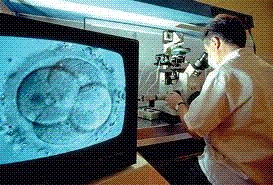Posthumous Birth Laws, In Vitro Fertilization, and other Legal Quandaries
Some of the trickiest areas of law deal with a subject that is by nature nebulous and fuzzy – the measurement of human life. When does it end? When does it begin? And how can laws be crafted around these boundaries, which are different for every person? Sometimes the law attempts to force these grey areas into arbitrary categories. Most of the time though, the laws simply don’t make sense.
Take, for example, an area of law that is recently receiving a lot of attention- posthumous birth laws. Posthumous birth is when a child is born after the death of a parent, usually the father. A person born in such circumstances is called a “posthumous child” or a “posthumously born person”. The laws covering posthumous birth tend to focus on issues like property inheritance and the child’s legal status. The question is usually: are posthumous children entitled to receive distributions from the father’s estate?
Now, laws covering this issue are already difficult to navigate. Each state’s posthumous birth laws vary widely, and there seems to be no golden standard to refer to. The issue gets further compounded by advances in reproductive technology, namely, in vitro fertilization.
 We are presently seeing more and more children being conceived through in vitro fertilization. But what happens when the father passes away before the child is even conceived? This situation was not previously a legal issue before the advent of in vitro fertilization technology, and courts are struggling to reach a consensus on the issue.
We are presently seeing more and more children being conceived through in vitro fertilization. But what happens when the father passes away before the child is even conceived? This situation was not previously a legal issue before the advent of in vitro fertilization technology, and courts are struggling to reach a consensus on the issue.
State laws do generally agree that if the father dies during his wife’s pregnancy, the child is entitled to receive benefits such as federal funding and inheritance rights from the father. However, if the father dies before conception, the child will not be entitled to benefits.
But does this make any sense at all? Is a donor not a father? It appears that the law has difficulty defining when the parent-child relationship actually begins. To give courts some credit though, we are dealing with new technological frontiers and uncharted territory. Courts faced similar difficulties with the phenomenon of abortion- cases involving abortion are notorious for arguing over the intricacies of when human life begins.
What perplexes me most is this: while the law is having difficulties dealing with real-live situations, there are several areas of law that use hypothetical, impossible situations as actual legal standards. These quandaries are known as “legal fictions”, and they are abundant particularly in instances dealing with human deaths and births, and of course, property distribution.
To illustrate, here are some of the more commonly known (and ridiculed) legal fictions:
- The Fertile Octogenarian: The law assumes that women can bear children even into their golden years, such as 80+ years old. This law applies in situations involving the property of transfer under the perpetually-hated rule against perpetuities. (A fertile 80-year old may actually become a possibility given the momentum of reproductive advancements. Is it desirable though? That’s another question.)
- The Unborn Widow: This fiction says that a man can marry a woman who has not even been born yet. This idea applies to transfers of property that are conditioned upon the death of the man’s wife. Such transfers are invalidated because of the possibility of the man marrying the unborn widow.
- The Precocious Toddler: This one states that some persons might be fertile at birth or early stages of life. (I foresee a future debate over Prop. 8,043,932: marriage between the Precocious ones and the Fertiles).
What is the world coming to? Or rather, what is the law turning the world into? In my opinion, laws do not need to imagine every conceivable situation and should instead focus on the ones that are actually happening.
So, back to a possible solution for the posthumous birth issue. Ok, maybe not a solution, but as a suggestion, perhaps the legal implications need to be worked out more thoroughly before the technology is birthed, so to speak. The legal implications of any new reproductive technology should be anticipated during the technology’s “conception” stages. The legal process has always struggled to keep pace with technology. And something needs to be done about that.
In other words, perhaps we need to see more interaction between researchers and legal experts. This is especially true when dealing with issues like reproduction and parenthood, and, (altogether now), property distribution. Or better yet, maybe we need more people who are trained in both scientific research and legal issues. Sounds rough, but it is possible. After all, the internet is making people smarter, right?


Comments
If you are already dead when the child is conceived then your estate has already been distributed to your heirs. The child will still get money when your wife dies.